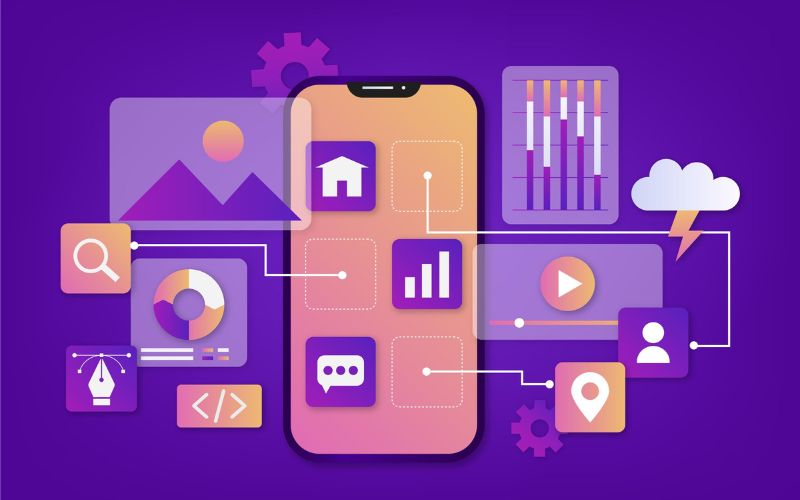In today’s digital age, mobile apps have become essential for businesses looking to expand their reach and streamline their services. Whether you’re an established company or a startup, investing in a reliable mobile app development service is a key move that can help differentiate your brand, boost customer engagement, and drive sales. In this comprehensive guide, we’ll explore the benefits of mobile app development, what to look for when choosing a service, and how to ensure your app delivers real value to your users and your business alike.
Why Invest in a Mobile App Development Service?
Mobile apps allow businesses to connect with their audience in unique ways, offering seamless access to services and products anytime, anywhere. Here are some of the primary reasons why businesses choose to invest in mobile app development:
-
Enhanced Customer Engagement: Mobile apps provide a direct line to customers, making it easy for users to access services, track orders, and receive support at any time.
-
Brand Awareness and Recognition: A dedicated mobile app boosts brand visibility and keeps your company top of mind for customers. The convenience and personalized experience offered by a well-designed app can foster strong brand loyalty.
-
Increased Revenue Streams: Apps open new opportunities for monetization through in-app purchases, subscriptions, and advertisements, providing a steady revenue stream that complements other channels.
-
Data-Driven Decision Making: Mobile apps offer valuable insights into user behavior, helping businesses understand customer needs better and adapt accordingly.
Key Factors to Consider When Choosing a Mobile App Development Service
Finding the right mobile app development service is crucial. The wrong choice can lead to delayed launches, budget overruns, and poor app performance. Here’s what to consider when selecting a development partner:
1. Experience and Expertise in Your Industry
Choose a service provider that has experience in your industry or has worked on similar projects. An experienced team is better equipped to understand your specific needs and anticipate potential challenges.
2. Comprehensive Development Process
An ideal mobile app development service will follow a well-defined process that covers all aspects of development, from initial design and prototyping to testing and deployment. This helps ensure a smooth and efficient workflow, reducing the chances of costly mistakes.
3. Cross-Platform Development
Given the variety of devices available, it’s essential for your app to run seamlessly on both iOS and Android. Look for a development service that specializes in cross-platform solutions to ensure your app reaches the widest possible audience.
4. Post-Launch Support and Maintenance
Mobile apps require ongoing updates and maintenance to ensure security, fix bugs, and improve functionality. Choose a provider that offers reliable post-launch support so your app remains up-to-date and continues to deliver a top-notch user experience.
5. Security and Compliance Standards
Security is non-negotiable in app development. Ensure the mobile app development service you choose adheres to industry security standards and is committed to protecting your users’ data.
Types of Mobile Apps and Choosing the Right Type for Your Business
The type of mobile app you choose will largely depend on your business goals and target audience. Here’s a look at the common types of mobile apps and how each can benefit your business:
1. Native Apps
Native apps are designed specifically for one operating system, either iOS or Android. These apps generally offer the best performance and user experience but come at a higher cost due to separate development for each platform.
2. Cross-Platform Apps
Cross-platform apps work on multiple operating systems with a single codebase, making them a cost-effective solution for businesses aiming to reach users on both iOS and Android. Although these apps may have minor performance trade-offs compared to native apps, modern frameworks like React Native and Flutter minimize these issues.
3. Web Apps
Web apps are accessed through a browser and are more affordable than native or cross-platform apps. They’re ideal for businesses that don’t need the advanced functionalities of a mobile app but still want a mobile-friendly solution.
4. Progressive Web Apps (PWAs)
PWAs are web apps that deliver an app-like experience on the browser. They’re fast, reliable, and can work offline, making them a popular choice for e-commerce businesses.
Building Your App with a User-Centric Approach
Regardless of the type, a successful mobile app is one that prioritizes the user experience. Here’s how to ensure your app is built with the user in mind:
-
Intuitive Design: Simplicity and ease of use are essential. Users should be able to navigate the app without confusion. A good mobile app development service will prioritize an intuitive design that aligns with the user journey.
-
Speed and Performance: No one likes a slow app. A reliable mobile app development service will focus on optimizing app performance, minimizing loading times, and ensuring smooth navigation.
-
Personalized Experience: Today’s users expect apps to remember their preferences and offer customized content. Integrate features like personalized recommendations, push notifications, and location-based services to keep users engaged.
-
Regular Testing and Iteration: User feedback is invaluable for app improvement. Regular testing and iterations ensure the app continually meets user expectations and incorporates feedback for ongoing enhancement.
Key Benefits of a Custom Mobile App Development Service
Working with a mobile app development service that offers custom solutions provides several competitive advantages:
- Tailored Solutions: Custom apps are built to match your specific needs, helping you stand out from competitors with unique features and designs.
- Scalability: A custom-built app can be scaled as your business grows, ensuring it can handle increased user traffic and new functionalities without compromising performance.
- Seamless Integration: Custom apps integrate more easily with other business systems, streamlining processes and enhancing productivity.
How to Evaluate the Success of Your Mobile App
After launching, it’s essential to track your app’s performance and make improvements based on user data. Key performance indicators (KPIs) to monitor include:
- User Retention Rate: This metric shows how many users continue using your app over time. High retention is a good indicator of user satisfaction.
- Daily and Monthly Active Users (DAU and MAU): DAU and MAU indicate how often users are engaging with your app. These metrics help you understand the app’s reach and user loyalty.
- Customer Lifetime Value (CLV): CLV measures the revenue generated by a user throughout their time using your app, helping you assess long-term profitability.
- User Reviews and Ratings: User feedback is a direct insight into how your app is performing. Pay attention to comments and make necessary updates to address common issues or requests.
Choosing the Right Mobile App Development Service: Final Thoughts
Investing in a mobile app development service tailored to your business needs can be transformative. By enhancing customer engagement, streamlining operations, and providing valuable user insights, a well-designed app is a powerful tool for growth. From choosing the right service provider to developing a user-centered experience, each step is crucial to delivering a successful app that resonates with users and aligns with your business objectives.
Conclusion
In a world where mobile usage continues to rise, a dedicated mobile app is no longer a luxury but a necessity for businesses aiming for sustained growth. The right mobile app development service will not only build an app that meets your specifications but also contributes to your broader business goals. Take the time to choose a service that understands your industry, offers robust support, and is committed to security and user satisfaction. With the right partner, your mobile app can become a core part of your brand’s success story.
For more interesting blogs click here.


